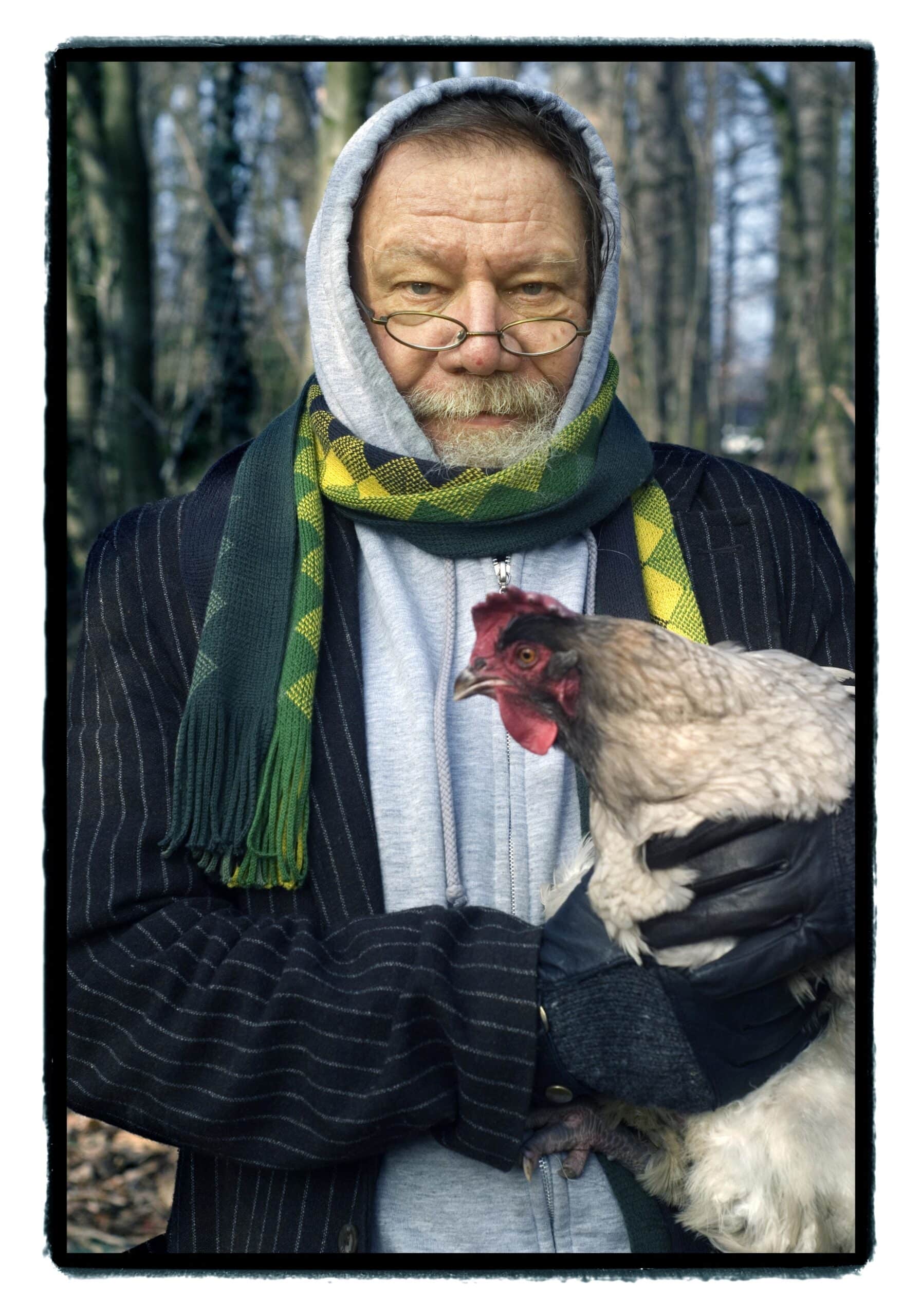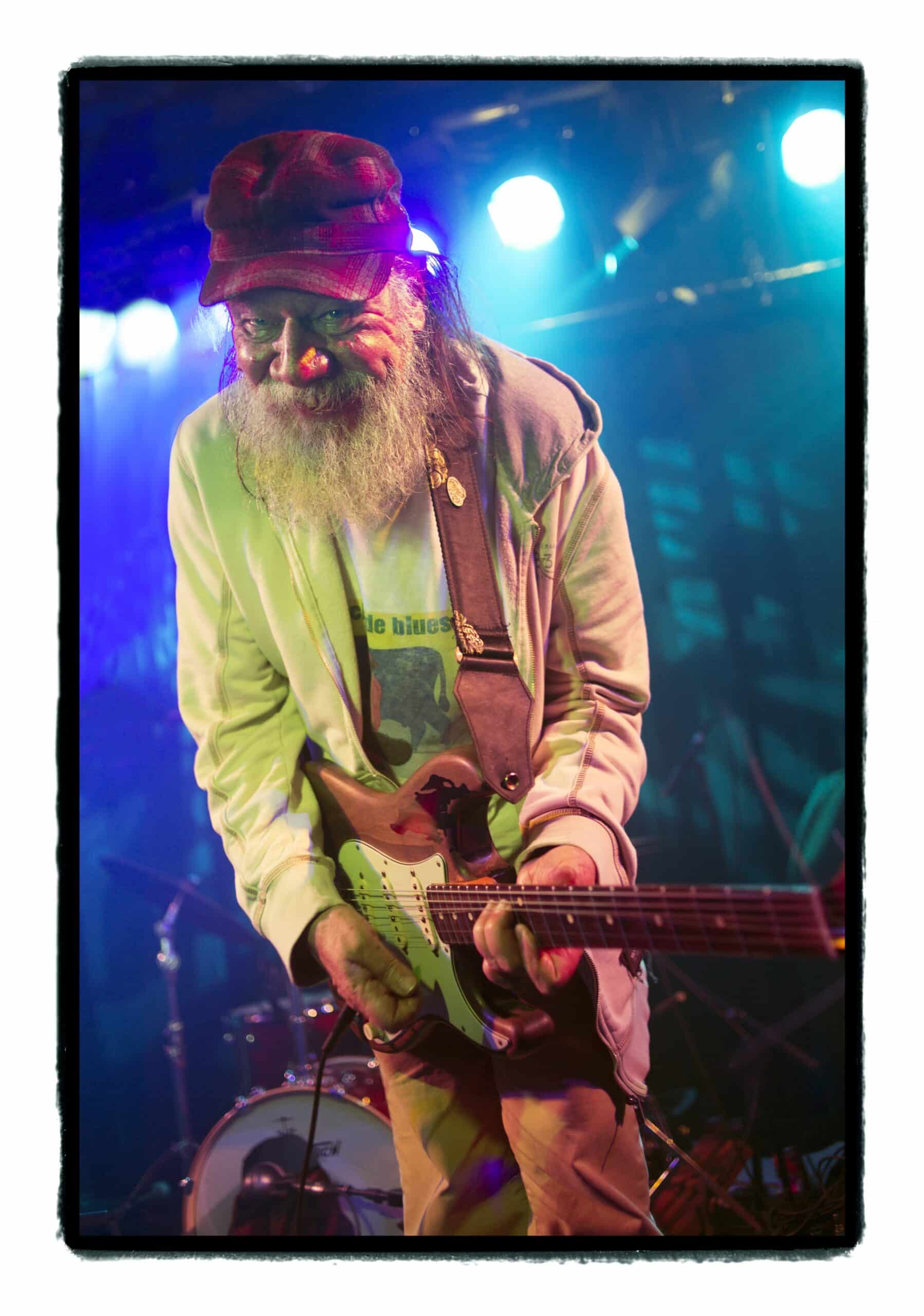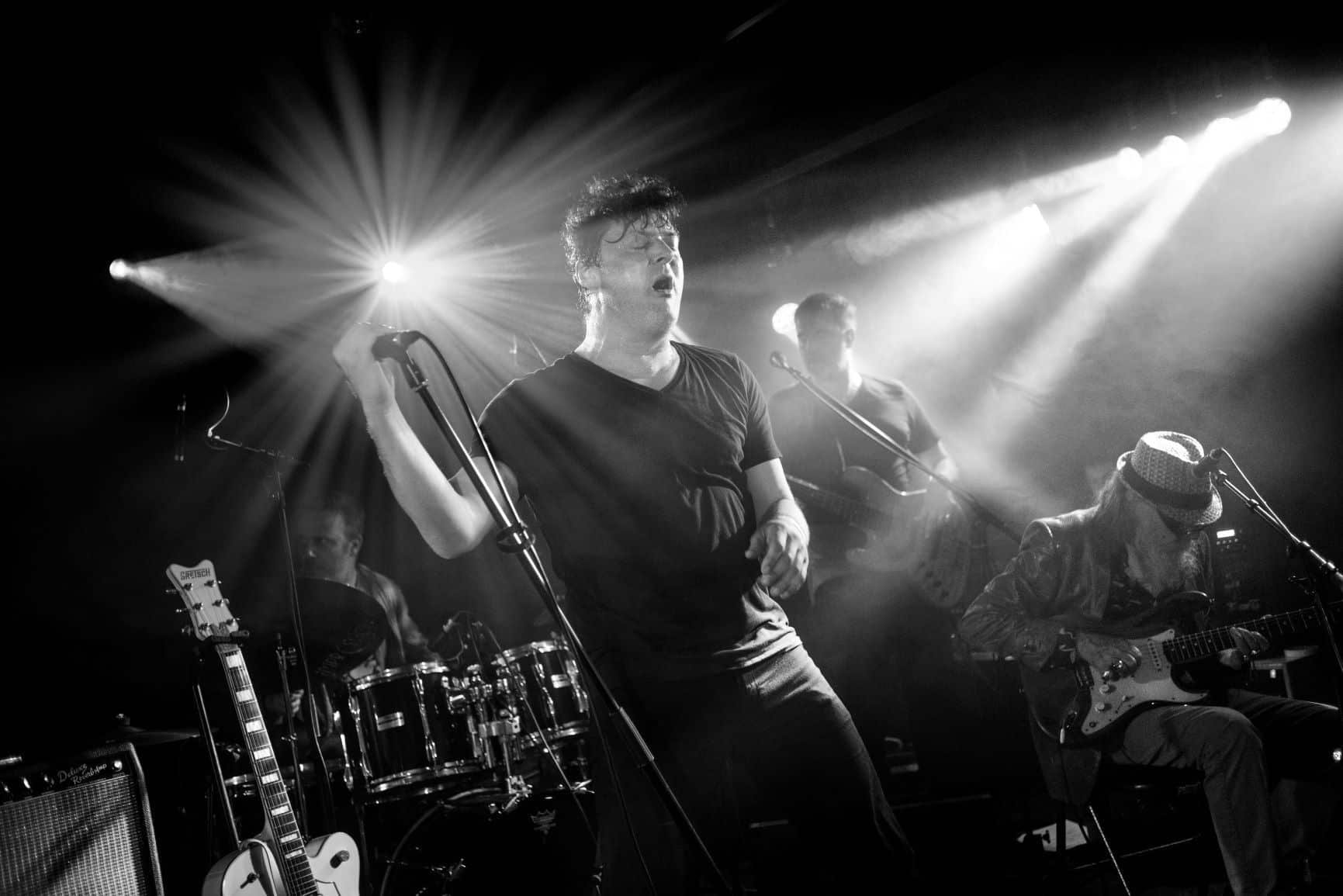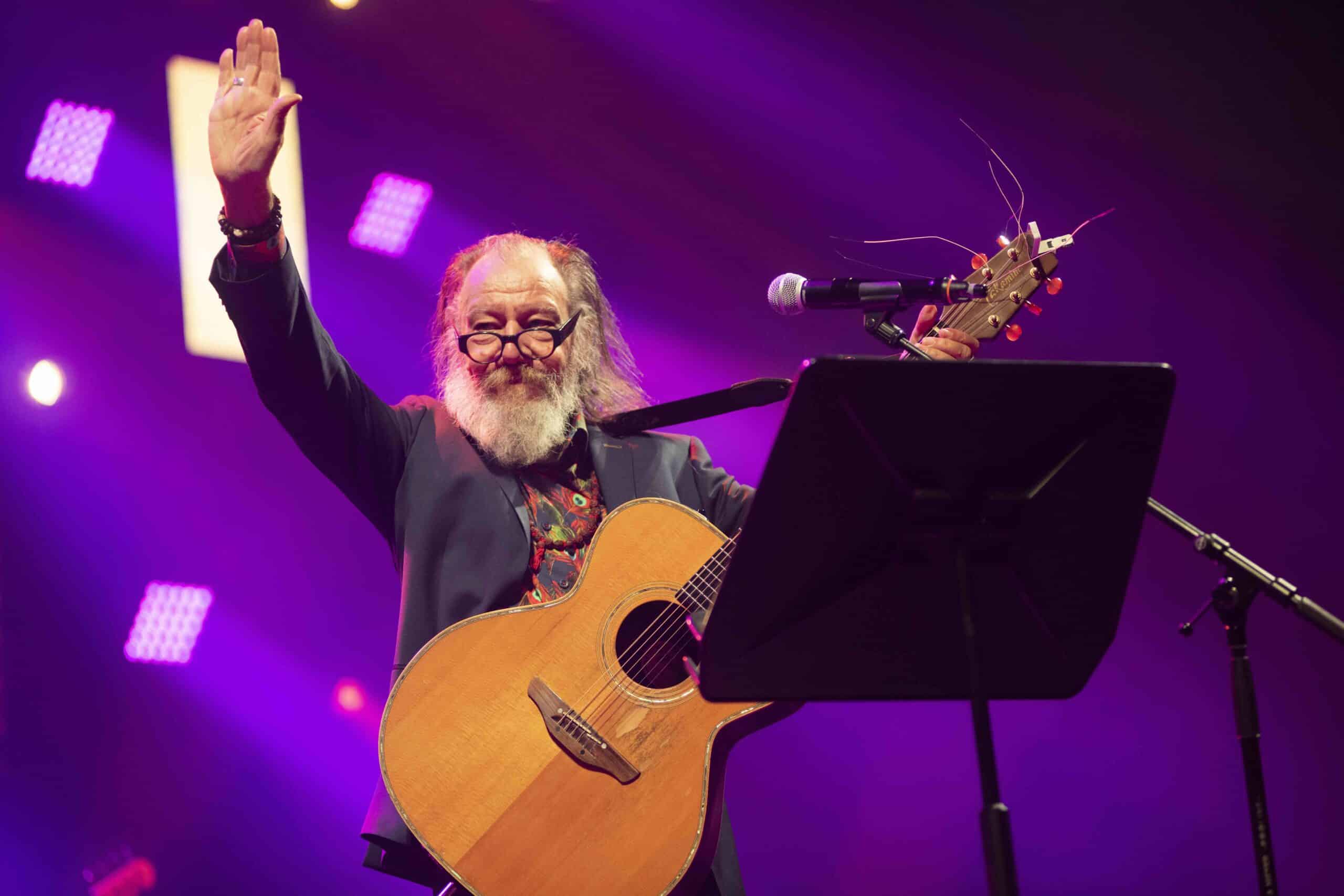Roland, Root Music’s Jolly Dandy
Despite his advanced years, Roland Van Campenhout will simply not budge. In fact, his recently released albums prove to be timeless classics by Flanders’ foremost roots rocker.
 Roland Van Campenhout
Roland Van Campenhout© Alex Vanhee
By his own admission, Roland – no last name necessary in Flanders – came into this world in 1944, on a kitchen table in the basement of his family home in Boom, in the middle of a V2 rocket attack. His father used to play the saxophone in a smooth jazz band and would take apart his instrument about once year to give it a thorough clean: ‘While he was busy doing that, he wouldn’t allow anyone to even come near him. I was so enamoured with that shiny horn as a little boy, and I’d given anything to blow it. There was one problem, though: that sax was about twice my size. I had to get up on a stool just to be able to hold it.’ His grandfather Henri was the conductor of the local Socialist Party’s wind band, and as a teen, Roland would be enthralled by the pairs of accordion players and drummers who would regularly perform in the bars surrounding the brickyards. So, yes, he was pretty much spoon-fed music from an early age.
His childhood was not trauma free. At the age of five, he witnessed his father drowning in a clay pit. Disgusted by his stepdad, who would constantly refer to him as ‘another man’s semen’, he decided to run away from home at fourteen. He rented a small room in Antwerp, and managed to make ends meet by taking on a slew of dull jobs. It wasn’t long before he fell under the spell of existentialism and the Beat Generation, and he started reading Henry Miller as well as Jack Kerouac’s
The Dharma Bums. ‘What was I drawn to in those novels? The idea of freedom. Hitchhiking all around the United States and crashing in a sleeping bag underneath the stars,’ Roland explains. Soon after, he decided to become a writer. He procured an old typewriter and attempted to contribute to free jazz literature.
Jazz, blues and folk music
Up until that time, Roland had only been listening to classical music, but being exposed to the beatnik scene, he fell in love with jazz and blues. John Lee Hooker, Lightnin’ Hopkins and Ray Charles were some of the first artists who got his imagination going. Afterwards, he discovered jazz cats including John Coltrane, Thelonious Monk and Charles Mingus. He took his careful first steps as a musician by playing the washboard in British skiffle band The City Ramblers. Together with the band, he would start mayhem all over Europe. Taking inspiration from local hero Ferre Grignard, he bought a guitar as soon as he finished his military service. In Ghent, Walter De Buck joined him in dissecting Leadbelly’s and Lonnie Donegan’s folk and skiffle repertoire.
Roland makes roots music in the widest sense possible
The early sixties’ New York folk revival did not go unnoticed by Roland either. Listening to albums by Bob Dylan, Tom Rush and Tom Paxton, he developed his own smooth fingerpicking technique. In 1967, he joined committed Flemish folk-rock duo Miek & Roel as a guitarist. After having attended a Jimi Hendrix concert in London, however, Roland decided to do things differently. He chose an “electric sound”, and founded his very own Bluesworkshop, a band with a ‘revolving doors’ policy, meaning anyone owning an instrument was welcome to join in for a jam session.
At Jazz Bilzen, the festival he performed at in 1969, Roland became fast friends with blues guitarist Rory Gallagher. That encounter proved to be quite critical, as the Irishman would take Roland with him on his European tour, meaning he was able to play iconic venues, including the Paris Olympia and the Royal Albert Hall in London. Roland would remain part of Gallagher’s main band for many years. The Ghent-based musician from the little town Boom remembers Rory being ‘rather enigmatic’, but ‘I considered him a soulmate.’
Rory Gallagher was not the only renowned artist Roland was able to count among his close friends. Legendary British folkies Bert Jansch and John Martyn stayed at his home for weeks. Roland also accompanied American singer-songwriter Tim Hardin on a television show and on a short Belgian tour. Furthermore, during his Latem years, he offered eccentric James Booker – nicknamed ‘the piano prince of New Orleans’ – a place to stay. Every one of these musician Roland played with treated him as their equal.
Improvisation is key
In 1971, at the time of the release of his solo album A Tune for You – the first in a long line of over 25 full length albums, New York record label CBS sent Roland a congratulatory telegram. However, this did not mean an international breakthrough. Roland was – and still is – quite the libertine; disgusted by the music industry, he wanted to give up as little of his freedom as possible. He lacked any commercial ambitions, and planning out his career was the least of his concerns.
Roland failed to make full use of the opportunities he was given
That attitude made him not always treat his talent with the necessary care, and he failed to make full use of the opportunities he was given. He just wanted to do his own thing, on a small scale. ‘I am not a company, am I,’ he smirks. ‘But I do need to be able to survive. That’s why I’ve become less careless over the years. Today, at 75, I’m perfectly aware of what I can and can’t do. I’ve never felt more comfortable in my own skin.’
Contrary to many popular artists, Roland cannot imagine playing the same songs for the rest of his life. ‘In my opinion, improvisation is the key everything. When I’m performing, nothing is set in stone; there is just a vague outline.’ A similar kind of ad-libbing takes place at the live renditions of his recent album Folksongs from a Non-Existing Land, a piece that party builds on Take One, an album he made with The Last Tribe, dating back to 1990. The psychedelic sounding compositions are a tribute to free form: drawn-out, repetitive and enchanting. Not only do they refer to Roland’s beatnik background, they are also indebted to oriental traditions.
During the sixties, the artist saw Indian sitar player Ravi Shankar performing. Quite an inspiring experience, for it was music ‘with a different understanding of time’. A while after, Roland lived in Singapore for a few years, and, while travelling to Bali and Java, he discovered even more meditational sounds. ‘A lot of what I do happens is not premeditated. I prefer to start from a blank page. But, just as often, I will allow projects to just simmer until the time is ripe for them to go out into the world.’
Without a parachute
Roland makes roots music in the widest sense possible. Blues, however, has always remained a consistent part of his oeuvre. He does not regard blues as a genre as such, but rather a state of mind. ‘To me, blues is a kind of meditation; it reflects what’s going on inside. One day you feel on top of the world, the next you are sad. A violin concerto by Tchaikovsky is blues as well, whatever those Bluespolizei
purists may say. Those guys are constantly throwing rules and regulations around, whereas I believe that basically anything goes. The ultimate way to avoid getting set in your ways is to open your ears wide and listen with an open mind.’
 Roland Van Campenhout
Roland Van Campenhout© Alex Vanhee
Clearly, Roland has written an immense list of songs, stretching over his long career. At the same time, a large part of his repertoire consists of traditionals, or songs by his predecessors, including Mississippi John Hurt, Tony Joe White, Richard Fariña and Bob Dylan. ‘I don’t distinguish between my own and other people’s work. I tend to play whatever suits my mood, or matches what I’ve experienced myself. Nevertheless, I would never simply copy someone else. I always interpret a song in my own way.’ He nevertheless believes originality as a concept is somewhat overrated. Folk singer Pete Seeger once stated: ‘If you steal from one person, you’re a thief. If you steal from a thousand, you’re a genius.’ Roland wholeheartedly agrees: ‘As an artist, you’re a sponge. You take in everything you see and hear. Even if you purposely try not to nick anything from your colleagues, things will still pop up that had been lingering in the back of your mind.’
Roland: 'I would never simply copy someone else. I always interpret a song in my own way'
Roland Van Campenhout will often claim he enjoys jumping from a plane without a parachute. This is a metaphor for the way he creates music. ‘Diving into the void without a clue where you’ll land: that’s what keeps me on my toes. It’s all about spontaneity with me. What counts is being in the moment, and each moment is unique. I love it when things are created on the spot. If you surround yourself on stage with the right people, you’ll never go wrong. When I’m playing the guitar in Pieter-Jan De Smet’s band, I will definitely sound different to when I’m calling the shots. As a musician you dispose of a number of little drawers you only open once in a while.’
 Roland van Campenhout as guitar player in the band of Pieter-Jan De Smet
Roland van Campenhout as guitar player in the band of Pieter-Jan De Smet© Alex Vanhee
Over the past fifty years, Roland has been anything but a one-trick pony. Folk, country blues, jazz, world music, pop, soul, rock and roll, film soundtracks: why choose, when you can have it all? Besides, he loves to force alliances with other musicians. Arno and he were both part of Charles & les Lulus, he made records with El Fish and Wannes Van de Velde, but he just as easily went into business with relative young guns the likes of Tom Van Laere aka Admiral Freebee (Never Enough) or Mauro Pawlowski (New Found Sacred Ground). ‘There’s no better way to educate yourself than jamming with other musicians, because we’re all so different and every person will trigger me in a unique way. Ideally, I try to give something new ago every single day. If you’re not moving forward, you’re moving backwards.’
Music as a binding agent
When it comes to his personal life, Roland feels like an elephant who always walks right outside the rest of the herd. He’d much rather spend time at home among his books and records than he would in a bar. ‘When you look at it like that, I’m somewhat of an individualist,’ he admits. ‘Yet at the same time I take great pleasure in interacting with fellow musicians. To me, music is a social binding agent, an international passport, if you like. I have no problem jamming with a Chinese person or an Inuit. I had a similar experience in Africa. I got out of the plane in Togo and that very same night I found myself on stage surrounded by local musicians. They might have only had beat-up instruments and shabby equipment, but everyone was beaming, and the music had a natural swing to it. That carefree, easy-going way of communicating is dear to my heart.’
Roland: 'To me, music is a social binding agent. I have no problem jamming with a Chinese person or an Inuit'
He might be known as an accomplished guitar player, Roland believes the human voice is the quintessential instrument, even if it sounds weathered and ragged, like his. ‘A guitar comes in handy to hide behind, but singing allows me rise above myself.’ After all those years, does he consider himself an artist, or a craftsman? ‘Craftsmanship is indispensable,’ he answers, after a moment’s thought. ‘I learn new things on a daily basis. Art, what exactly is that? A writer, painter or sculptor can spend months quietly fine-tuning his work. But someone flying through the air hanging from a trapeze, a circus clown, a knife thrower who manages too just miss his wife: these are artists in their own right. Just like musicians, they appeal to the audience directly. Afterwards, what they do is lost for good, and you can’t do anything about it. That doesn’t matter to me – I think it’s important the audience enjoy a great night out. Being able to do something like that night after night truly is a blessing.’
 Roland Van Campenhout
Roland Van Campenhout© Alex Vanhee
Roland likes to paint an image of himself as the eternal rascal. Alternatively, a jolly dandy who manages to put off growing up forever because he happened to choose this particular profession. ‘There are no limits when it comes to your imagination. Everything’s possible, anything goes. When I’m in the studio, I still feel like a child who gets to play in the sandpit. The mind is totally free, but the body starts playing up: your knees get creaky, your back starts hurting. True, the clock is ticking a lot louder today than it was around 25 years ago, but I’m not worried. As I’m getting older, I’m increasingly convinced that there’s no such thing as time. Everything’s fleeting: we’re here and we’re gone. Tough luck. However, I won’t let that stop me from performing on stage up until my dying breath.’












